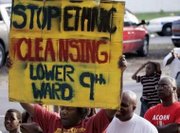Monday, April 23, 2007
Still-The Infamy of Injustice:In the Undertow
PLESSY-FERGUSON 2007
UPDATED-7May2007-2:17CST-hlr
[Keith Weldon]Medley, also on hand for the Supreme Court gathering, said there are many ironies in the Plessy saga.
One of them, he said, is the fact that the Supreme Court building sits on land formerly occupied by an extension of Exchange Alley, where the plan that included Homer Plessy's arrest was hatched in the office of black lawyer Louis Martinet.
Know wonder present Chief Justice Pascal Calogero is firmly against moving the Supreme Court in New Orleans to Baton Rouge. The routes of american judicial injustice emanates from the 400 Royal Street headquarters of the Louisiana Supreme Court. hlr
The following opinion article appeared in the Alexandria Town Talk the weekend of April 21, 2007
Our view: La. gives judge only one choice: Don't prosecute
It's a busy spring weekend in Central Louisiana: a French film festival, a jazz festival and Jazz on the River, an outdoor market, trade days, a big garage sale, a wild night at the zoo, a festival in Magnaville and much more. Check out the Day-by-Day calendar in the Friday A.M. section. Elsewhere in the news, prosecution of criminal suspects in New Orleans was stopped for lack of adequate representation; and the Louisiana Road Home management company can be fined if it fails to move faster to meet with applicants and resolve complaints. Our views follow:
State Judge Arthur Hunter stopped the prosecution of 42 suspects in New Orleans because the city's indigent defender's office cannot adequately represent them.
Hunter set a hearing for May 7 for 45 other defendants whom he said are poor and cannot get adequate representation. Hunter's order did not dismiss the charges.
State Rep. Danny Martiny, chairman of a legislative task force on indigent defense, said he's filing a bill that would set up a statewide indigent defense board, replacing the state's 41 local boards.
"Right now, there are no unified standards, no accountability. If this bill passes, that would change," said Martiny, R-Kenner.
Last year, lawmakers doubled state funding for indigent defense statewide, from $10 million to $20 million annually. Martiny said he expects the Legislature to approve an additional $7 million for indigent defense this year.
We think: This is a step in the right direction, even if it is much too small and nowhere near aggressive enough. Uniform guidelines, more attorneys, adequate compensation for defenders, funds for detectives and DNA tests -- all have been missing forever in Louisiana, the poster child for states that deny people their legal rights. Access to qualified legal representation is codified in the documents that made this nation. Too often, poor people never get to exercise that right. In Orleans Parish alone, between $7 million and $10 million a year more is needed to provide such defense.
The company managing the Louisiana Road Home program will lose up to $100,000 a month if it fails to move faster to meet with applicants, make grants and resolve disputes. The new requirement has been added to the state's contract with ICF International Inc. of Virginia.
ICF is being paid more than $750 million by the state to administer the program -- a poorly thought-out plan to get hurricane evacuees back on their feet. The fact the contract has virtually no benchmarks to measure progress tells you this deal made by Democrat Gov. Kathleen Blanco is fraught with problems and no accountability.
We think: What's $100,000 a month to ICF? It has $19 million of our state money allocated just to reimburse its employees for their Road Home-related travel. The proposed fine is peanuts.
120-Day Wait-in-Jail Urged For Louisiana Suspects!Legislation currently on tap when session begins April 30, 2007, would affect the entire state. The state House bill is sponsored by Rep. Scalise.
UPDATED-7May2007-2:17CST-hlr
[Keith Weldon]Medley, also on hand for the Supreme Court gathering, said there are many ironies in the Plessy saga.
One of them, he said, is the fact that the Supreme Court building sits on land formerly occupied by an extension of Exchange Alley, where the plan that included Homer Plessy's arrest was hatched in the office of black lawyer Louis Martinet.
Know wonder present Chief Justice Pascal Calogero is firmly against moving the Supreme Court in New Orleans to Baton Rouge. The routes of american judicial injustice emanates from the 400 Royal Street headquarters of the Louisiana Supreme Court. hlr
The following opinion article appeared in the Alexandria Town Talk the weekend of April 21, 2007
Our view: La. gives judge only one choice: Don't prosecute
It's a busy spring weekend in Central Louisiana: a French film festival, a jazz festival and Jazz on the River, an outdoor market, trade days, a big garage sale, a wild night at the zoo, a festival in Magnaville and much more. Check out the Day-by-Day calendar in the Friday A.M. section. Elsewhere in the news, prosecution of criminal suspects in New Orleans was stopped for lack of adequate representation; and the Louisiana Road Home management company can be fined if it fails to move faster to meet with applicants and resolve complaints. Our views follow:
State Judge Arthur Hunter stopped the prosecution of 42 suspects in New Orleans because the city's indigent defender's office cannot adequately represent them.
Hunter set a hearing for May 7 for 45 other defendants whom he said are poor and cannot get adequate representation. Hunter's order did not dismiss the charges.
State Rep. Danny Martiny, chairman of a legislative task force on indigent defense, said he's filing a bill that would set up a statewide indigent defense board, replacing the state's 41 local boards.
"Right now, there are no unified standards, no accountability. If this bill passes, that would change," said Martiny, R-Kenner.
Last year, lawmakers doubled state funding for indigent defense statewide, from $10 million to $20 million annually. Martiny said he expects the Legislature to approve an additional $7 million for indigent defense this year.
We think: This is a step in the right direction, even if it is much too small and nowhere near aggressive enough. Uniform guidelines, more attorneys, adequate compensation for defenders, funds for detectives and DNA tests -- all have been missing forever in Louisiana, the poster child for states that deny people their legal rights. Access to qualified legal representation is codified in the documents that made this nation. Too often, poor people never get to exercise that right. In Orleans Parish alone, between $7 million and $10 million a year more is needed to provide such defense.
The company managing the Louisiana Road Home program will lose up to $100,000 a month if it fails to move faster to meet with applicants, make grants and resolve disputes. The new requirement has been added to the state's contract with ICF International Inc. of Virginia.
ICF is being paid more than $750 million by the state to administer the program -- a poorly thought-out plan to get hurricane evacuees back on their feet. The fact the contract has virtually no benchmarks to measure progress tells you this deal made by Democrat Gov. Kathleen Blanco is fraught with problems and no accountability.
We think: What's $100,000 a month to ICF? It has $19 million of our state money allocated just to reimburse its employees for their Road Home-related travel. The proposed fine is peanuts.
120-Day Wait-in-Jail Urged For Louisiana Suspects!Legislation currently on tap when session begins April 30, 2007, would affect the entire state. The state House bill is sponsored by Rep. Scalise.
Subscribe to:
Post Comments (Atom)











No comments:
Post a Comment